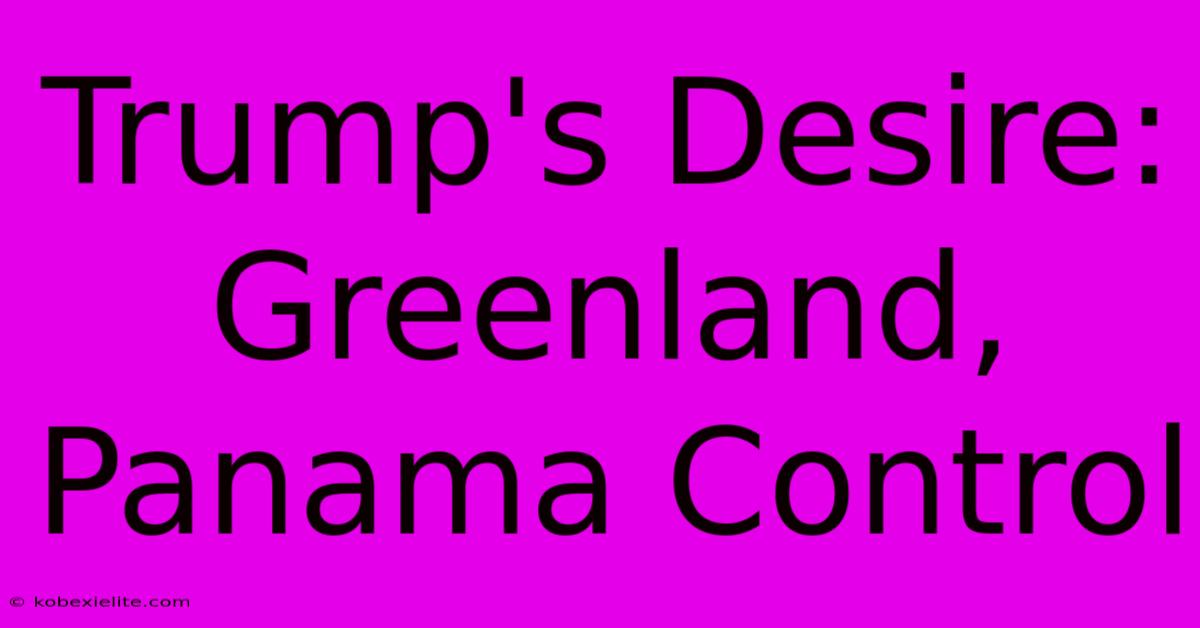Trump's Desire: Greenland, Panama Control

Discover more detailed and exciting information on our website. Click the link below to start your adventure: Visit Best Website mr.cleine.com. Don't miss out!
Table of Contents
Trump's Desire: Greenland, Panama Control – A Look at the Geopolitical Ambitions
Donald Trump's presidency was marked by several bold, and often controversial, geopolitical ambitions. Among them, his expressed interest in acquiring Greenland and his administration's dealings with Panama stand out as significant examples of his foreign policy approach. This article delves into these two cases, examining the motivations behind these desires and their implications for international relations.
The Greenland Gambit: Acquisition or Influence?
Trump's sudden and public expression of interest in purchasing Greenland in 2019 shocked many. The idea, dismissed by the Danish government as "absurd," sparked a diplomatic row and revealed a surprising aspect of Trump's worldview. While the specifics of his proposal remained vague, the underlying motivations likely stemmed from several factors:
Strategic Location and Resources:
Greenland's strategic geographic location, its vast reserves of minerals (including rare earth elements crucial for modern technology), and its potential for resource exploitation clearly presented a strong allure for Trump's "America First" agenda. Controlling Greenland could significantly enhance US influence in the Arctic region, a zone of increasing geopolitical importance due to climate change and resource accessibility.
Countering Chinese Influence:
Concerns over growing Chinese influence in the Arctic, particularly regarding resource extraction and infrastructure development, likely fueled Trump's interest. Acquiring Greenland could be seen as a way to preempt or counterbalance Chinese ambitions in the region.
National Security and Defense:
Greenland's strategic location offers significant advantages for military and defense operations. Access to air bases and potential deployment locations could bolster US national security and provide a counterweight to potential adversaries.
The Greenland proposal ultimately failed, but it highlighted the importance Trump placed on acquiring strategic assets and expanding US influence globally.
Panama: A Balancing Act
Trump's administration's relationship with Panama was more nuanced than the Greenland episode. While not openly expressing a desire for acquisition, the administration focused on maintaining strong ties and influencing Panama's policies in areas considered vital to US interests.
The Panama Canal: A Critical Trade Route
The Panama Canal's significance as a crucial trade route for the US and global commerce was paramount. Maintaining US influence over the Canal's operations and security was, and continues to be, a key foreign policy priority.
Security and Counter-Narcotics Cooperation:
Collaboration on security and counter-narcotics initiatives remained a central aspect of the US-Panama relationship during the Trump administration. Panama's strategic location makes it a significant player in combating drug trafficking, and cooperation in this area served mutual interests.
Economic Ties and Investment:
The Trump administration actively sought to foster strong economic ties and encourage US investment in Panama. This approach aimed to strengthen the bilateral relationship and promote US economic interests in the region.
The Broader Context: Populism and Geopolitical Strategy
Both the Greenland and Panama examples highlight distinctive elements of Trump's foreign policy approach: a willingness to challenge established norms, a focus on transactional deals, and a strong emphasis on national interests, often expressed in a populist manner. These actions sparked debates about the appropriateness and effectiveness of such strategies in the context of international diplomacy.
Conclusion: Legacy and Implications
While Trump's overt attempt to acquire Greenland ultimately failed, his interest in the region, combined with his administration's engagement with Panama, reveals a broader pattern of seeking to enhance US influence in strategically significant locations. These actions, though often controversial, had significant implications for US foreign policy and continue to shape the geopolitical landscape today. The legacy of these endeavors remains a subject of ongoing discussion and analysis. The long-term impacts on US relations with Greenland, Denmark, and Panama continue to unfold. Further research is needed to fully understand the lasting consequences of Trump's geopolitical ambitions.

Thank you for visiting our website wich cover about Trump's Desire: Greenland, Panama Control. We hope the information provided has been useful to you. Feel free to contact us if you have any questions or need further assistance. See you next time and dont miss to bookmark.
Featured Posts
-
Christmas Liquor Store Hours Tn
Dec 24, 2024
-
Kremlin Rejects Assad Divorce Claims
Dec 24, 2024
-
Gaetz Faces Ethics Inquiry Paid Sex Underage Girl
Dec 24, 2024
-
Santa Tracker 2024 Follow His Route
Dec 24, 2024
-
Knicks Boast Strong Rookie Talent
Dec 24, 2024
